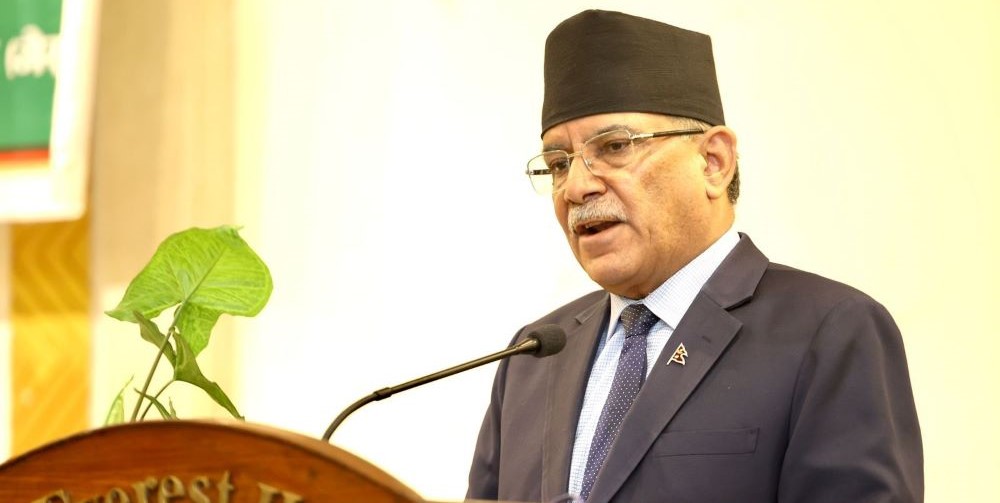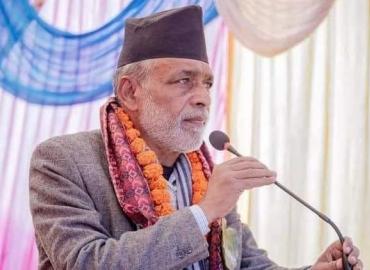Kathmandu, Oct 12: Prime Minister Pushpa Kamal Dahal 'Prachanda' has said that the government is ready to form a high-level mechanism for addressing problems seen in the economy at present.
The Prime Minister said this while addressing the 'National Economic Debate' organized by the Federation of Nepalese Chambers of Commerce and Industry (FNCCI) here today. On the occasion, the PM said the government was ready to form such a mechanism as proposed by the private sector.
"It is required that all sectors are in one place and there is a centralized expression for improving the economy. We need this kind of mechanism as we need suggestions and guidelines to initiate a new dimension for economic reforms," the PM said, adding that the efforts for improving the economy could be started from this very point. He asserted that the government is ready to make such a mechanism as proposed by the private sector.
Chairperson of the Dialogue and FNCCI president Chandra Prasad Dhakal had proposed to make a high-level mechanism for improving the country's economy and the PM, who addressed the programme after this, agreed to the proposal.
Stating that the government is about to take a 'bold decision' for economic reforms, PM Prachanda opined that improvement of the overall economy would not be possible through 'minor operation'.
"The main problem of the economy is not resolved despite taking the path of reform. Pathwork-type reform is not adequate and there needs to be a policy shift," he reiterated. The PM also shared on the occasion that the government has made long efforts to have a synchronization of the finance policy and the monetary policy.
He also claimed that the overall economic situation of the nation could not improve if the government did not facilitate the private sector in their business enterprises. The PM reiterated that Nepal itself will make a decision as to how the problems seen in the country's economy are addressed.
The Prime Minister said the government would restructure the nation's economy through the next fiscal year's annual policies and programmes.
Minister for Industry, Commerce and Supplies Ramesh Rijal said that the citizens' morale has been down due to the narrative that is being fomented forcefully that the economy is in the doldrums. He said this narrative should be shattered.
According to him, although the economy is not growing at present, it is not slumping either. "It would create even more problem if the narrative that the country is crisis-hit is spread," he said and called for the united efforts of all sectors, including the private sector in improving the economy.
FNCCI president Dhakal spoke at length highlighting the condition of the economy, calling for urgent action with the government and the private sectors working together to improve it.
Chief economic advisor of the Ministry of Finance Poshraj Pandey said the current critical economic problem was a continuation of problems that piled up in the past.
Stating that there was no uniformity about the present economic situation (the private sector points out economic problems, but the government denies it), economist Dr Achyut Wagle stressed the need for bringing out facts about the current economic situation.
President of the Nepal Chamber of Commerce Rajendra Malla called for the government to bring a monetary policy that suits the goals of economic growth.
Vice President of the Confederation of Nepalese Industries Birendra Raj Pandey said the time has come to restructure Nepal's economy.
Similarly, President of the Federation of Nepalese Industries and Commerce Khimlal Bhandari pointed out structural problems in Nepal's economy.
President of the Federation of Nepali Cottage and Small Industries Umesh Prasad Singh argued that there was not recognition of the contribution of cottage and small to the country's economy.
Also, the General Secretary of the Federation of Nepalese National Industry and Enterprises Bhagirath Sapkota viewed that the state should recognize the role of the cottage and small industries in building a socialism-oriented society as envisioned by the constitution of Nepal. Industry-friendly laws are also required, he added.(RSS)






















